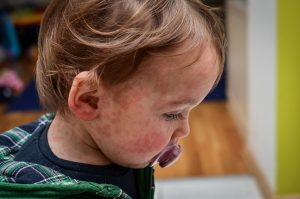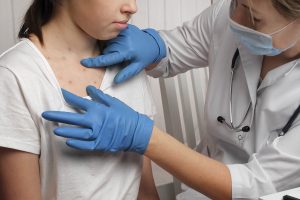Measles: Just the Facts

Measles: Just the Facts
With the recent outbreak of measles across the United States, there has been a wealth of information published about the measles…and unfortunately some misinformation. What is important for you to know to protect your family and loved ones? Memorial Care’s Omar Al-Heeti, MD, specializes in internal medicine and infectious diseases. He weighs in below.
Is measles really that big of a deal?
Yes. It spreads very fast and easily. The U.S. Department of Health and Human Services (HHS) considers it the deadliest of all childhood rash/fever illnesses.
The people most vulnerable to measles are those younger than 5 and older than 20.
“Measles can be spread through the air by coughing and sneezing with symptoms of fever, runny nose, coughing and a rash,” said Dr. Al-Heeti. “Complications from the infection can be ear infection, hearing loss and pneumonia, which is the main cause of death in young children. It is important to understand that everybody needs to be vaccinated to prevent these complications.”
Wasn’t measles eliminated in the United States?
In 2000, measles was considered eliminated. However, that designation doesn’t mean the disease doesn’t exist anymore or that people can’t still get it. It means there were at least 12 continuous months in which a disease wasn’t transmitted in a specific area. People can still contract the disease in places where it is considered eliminated.
The Centers for Disease Control and Prevention now tracks confirmed, not suspected, cases and are currently reporting 884 confirmed cases in the United States as of April 2025.
If a person is vaccinated against measles, doesn’t that mean he or she can’t get it?
Most of the time. The CDC reports that more than 95 percent of people who receive even one dose of the vaccine for measles, mumps and rubella (MMR) will be protected from getting all three diseases.
The second dose will give immunity to anyone who received the first but did not become immune. Memorial Care family physician Gustavo Mosquera, MD, encourages patients to be vaccinated to protect against the risk of contracting the measles.
“Two doses of MMR provide about a 97-percent effective rate,” Dr. Mosquera said. “But even with two doses, you can get some failure. This means that the vaccine it is not 100-percent effective and you can still get the disease even though you have been vaccinated. In my opinion, though, at 97 percent, it is excellent, and I recommend all children to be vaccinated.”
What is the best way to prevent measles?
Vaccinate. The HHS outlines the usual vaccination schedule for children, with the first dose at 12-15 months and another before entering school (ages 4-6).
Travelers are especially encouraged to be vaccinated because measles is still common in other parts of the world, including Europe, Asia, the Pacific and Africa.
If you or your child haven’t been vaccinated or you are not sure you have received both doses, check with your healthcare provider.
Measles is a serious illness; if you have questions about the disease or about vaccines, call your physician. Looking for a new physician? Visit memorial.health.
